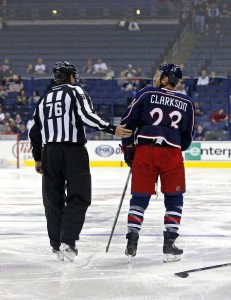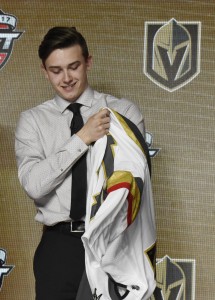The Vegas Golden Knights are in a better situation now than any of the last few NHL expansion franchises. Sure, some would look at their roster and see a team that could easily finish last in the entire league, devoid of high-end talent or superstar potential; but as we’ve already discussed they had a heck of a first entry draft and are set to improve themselves again at the deadline this year. It could be a quick build for the league’s 31st franchise. 
Following Nate Schmidt‘s arbitration decision this weekend, in which the Golden Knights locked up another trade deadline asset for a reasonable price, the team currently projects to have around $5.6MM in cap space for the upcoming season. That number may not look very large, but it is actually quite deceiving. The Golden Knights have two players—David Clarkson and Mikhail Grabovski—who will never suit up for another NHL game and are destined for long-term injured reserve should the team need it. Their combined cap hit of $10.25MM would be available to the Knights if they acquired more salary, and there is where the team will really bring in the most value.
Clarkson and Grabovski are already examples of how eating a bad contract can be beneficial for a team. The Columbus Blue Jackets and New York Islanders both sent a first-round pick this year and a second-round selection in 2019 to move the contracts off the books (and decide which player would be selected in the expansion draft), leading to Vegas’ huge draft haul. Those deals are just the tip of the iceberg for what Vegas could pull off in the next few years. In July, Vegas owner Bill Foley made it clear that there was “no budget” for the club, and that they’d use financial muscle to vault them into the NHL spotlight right away.
Vegas also has eleven defensemen at the moment, and whether or not that is reduced by trade prior to the year or burying certain contracts in the minors, there is more space coming off the salary cap for the NHL team. Even a conservative estimate of an additional $3MM in created room puts the team at around $19MM in in-season cap space, a huge number they could use to their advantage. Recently we’ve looked at some of the worst contracts in the league, both in a per-point capacity and looking forward on long-term deals. Vegas is a clear landing spot for any of these under-performers.
 The question then, becomes whether the team believes it can truly compete in the next five years. Acquiring bad contracts is fine if you’re committed to a long rebuild, one that will be starting to turn into a competitive window as the contracts expire. But if Vegas GM George McPhee believes that the trio of Cody Glass, Nick Suzuki and Erik Brannstrom will jump start the process enough to really compete before say, Dustin Brown‘s five remaining years expire then they have to be hesitant to acquire such a bad deal.
The question then, becomes whether the team believes it can truly compete in the next five years. Acquiring bad contracts is fine if you’re committed to a long rebuild, one that will be starting to turn into a competitive window as the contracts expire. But if Vegas GM George McPhee believes that the trio of Cody Glass, Nick Suzuki and Erik Brannstrom will jump start the process enough to really compete before say, Dustin Brown‘s five remaining years expire then they have to be hesitant to acquire such a bad deal.
Vegas has just $11.6MM committed to active players for the 2019-20 season. Whatever you say about their decisions in the expansion draft, they’ve put themselves in a position to act as a sort of cap haven for teams around the league and stockpile young assets because of it. They already have fourteen picks in rounds 1-3 of the next three drafts, including a whopping seven selections in 2019. They’ll easily have even more than that at the end of the year, and more still the summer after that. Draft picks are like lottery tickets, but if you’re the only one playing you stand quite a good chance of winning.
Photos courtesy of USA Today Sports Images

They’ve got to have more than 7 picks in 2019, because that is average, not whopping.
The 7 is the amount of rounds 1-3 in 2019. They have 12 overall that year right now.
Ah, thank you. Read that wrong.
It will be interesting to see how these deals get valued. When Vegas took on bad contracts during the expansion draft they were either injured players whom Vegas could get cap relief from, or veterans in the final year of their deal who might be a bit overpriced but if they bounce back could be flipped again for an additional return. In both cases Vegas got picks and/or prospects to make it worth their while, but they return was inflated because Vegas was also passing on more attractive options in the Expansion Draft.
Here though its’ a different story because while some teams may look to move an impending FA contract that they don’t want, most of the guys that teams could look to dump will be 2-5 year deals that Vegas won’t be able to play on LTIR to get the cap relief. The Golden Knights will need to come up with a value to take on these cap hits in future years.
Yeah I could see something like maybe a second for 2 years at under 5 mil, over 5 is a first. A first and 4th for 3 years over 5, and a first for 3 years at about 3.5. 4 years over 5 is a first and a 3rd, 4 years at about 4 is a first and a 5th. I would imagine they won’t take on anything longer than 4 years. I’m just ballparking at about on the lower end of the AAV figures because obviously 2 million in cap relief isn’t worth a first rounder, but that pricing system would make sense.
Yeah I think for the most part they would want to avoid going beyond 3-4 years, since that starts to get into their hopeful window of being competitive, but it will probably be different for every situation, depending on just how functional the player they are getting back is and how desperate the other team is to get rid of his contract.
For instance if the Capitals wanted to trade Brooks Orpik, and his $5.5M cap hit the next two seasons, Vegas could probably get a lot more from them since the Capitals are in such a cap bind this year. They right now can’t even afford their projected roster, and they would be relying on a number of rookie or inexperienced players to try to go on another Cup run. Moving Orpik not only means they could afford their projected roster, but they can use some of the savings to add some cheaper vets to fill out their roster. Also it would allow them to retain some of their FAs next year. Orpik though is simply not functional and he would prob. be below the other big contract defenseman on Vegas’ roster.
Depending on what teams are willing to offer in addition to a guy on a bad contract with term left, I could see Vegas taking on 1 or 2 of those types of guys because they could stretch them out. Take Dustin Brown for example. If the Kings are willing to attach multiple picks or prospects to him, I could see Vegas taking him despite his contract. They could ride out Brown for 2 or 3 years while their young players develop/farm builds and then waive him via the stretch provision.
Found the NBA fan.
(There is no stretch provision in the NHL. There is however a buyout option, which has a similar effect and could be used on Brown at some point)